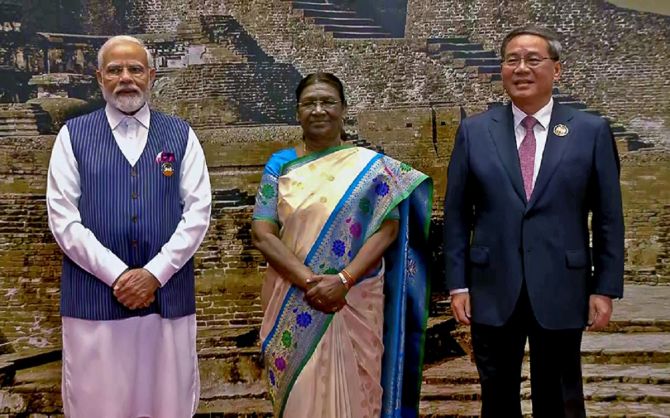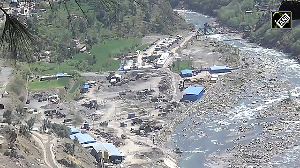On a difficult mission deputing for Chinese President Xi Jinping at the G20 summit, Premier Li Qiang had tough two days in New Delhi endorsing the joint declaration stated to be the biggest success for the host India which successfully navigated through the differences of China and Russia especially over Ukraine.

Li also had a difficult meeting with some of the Western leaders on the sidelines, especially Italian Prime Minister Giorgia Meloni, who has signalled Italy's resolve to quit China's famed Belt and Road Initiative for its failure to bring the expected results to Rome.
Also, India hogged the limelight as the African Union has been admitted as a permanent member of the G20 at the New Delhi summit after a successful diplomatic campaign by India in the run-up to the summit.
China over the years made big inroads in Africa with big-ticket infrastructure investments under President Xi's ambitious Belt and Road Initiative which also drew criticism for its debt sustainability, especially of smaller countries.
On Sunday, Li had a meeting with British Prime Minister Rishi Sunak who told him of London's concern about China's interference in democracy in the UK following the arrest of a parliamentary researcher for spying.
Li for his part told Sunak that both sides should properly handle differences, uphold the spirit of inclusiveness and mutual learning, and respect each other's core interests and major concerns.
Li urged the United Kingdom to oppose politicising economics and trade, and strive to build an open world economy, the official media here reported.
Hong Kong-based South China Morning Post quoted analysts as saying that India and the US made the best out of the inexplicable absence of Xi, who is the most powerful leader of China after CPC founder Mao Zedong.
The two countries “promoted US-led multilateral lending to counter China's infrastructure diplomacy, went on a charm offensive with developing nations and inserted some minimal language into the communique that indirectly condemned Chinese ally Russia over its Ukraine invasion”, the Post summed up the outcome of the New Delhi G20 summit.
Both Xi and Russian President Vladimir Putin did not attend the summit.
While there's been “a lot of analysis about who is or isn't in Delhi for this summit and why or why not that may be, the United States is focused on the fact that President (Joe) Biden is here and rolling up his sleeves with the other G20 countries and partners to produce real results,” said Jon Finer, principal deputy national security adviser on Saturday in New Delhi.
“It's incumbent upon the Chinese government to explain why a leader would or would not participate,” he told the Post.
Biden spoke of Xi's absence: “It would be nice to have him here but the summit is going well.”
Besides issuing the joint statement, which was previously speculated to be the most difficult, the assembled leaders announced a memorandum of understanding to establish the “India-Middle East-Europe Economic Corridor”, a multinational rail and ports deal linking the three regions.
"This comes as the Biden administration tries to counter Xi's massive signature BRI by touting Washington as an alternative partner and investor for developing countries," the Post report said.
“This is a big deal. This is a real big deal,” said Biden in announcing the pact, aimed at promoting clean energy and better communities.
“As we work to address infrastructure gaps across low- and middle-income countries, we need to maximise the impacts of our investments.”
On Saturday, Li had a difficult meeting with Meloni whose government has openly expressed disenchantment with the BRI.
The Italian Foreign Minister Antonio Tajani who visited Beijing on September 5 has spoken critically about the BRI, saying it “did not bring the results we expected” and many Italian parties were against Italy's participation.
This comes ahead of China's plans to hold the third conference of BRI in Beijing next month. If Italy pulls out, it will be regarded as an embarrassment for Xi's multi-billion-dollar pet project which also drew criticism about its debt sustainability, especially of smaller countries.
Also, much to the disquiet of China, Prime Minister Narendra Modi on Saturday announced plans to launch the India-Middle East-Europe economic corridor which includes India, the UAE, Saudi Arabia, the European Union, France, Italy, Germany and the US.
State-run Global Times on Sunday quoted experts stating that the true purpose of the Biden administration is trying to "isolate China" in the Middle East, a region where Chinese cooperation with the region has constantly gained momentum in recent years.
Zhou Rong, a senior researcher at the Chongyang Institute for Financial Studies at Renmin University of China, told the Global Times that the US lacks both the genuine intention and the capability to follow through on its pledge to build up the transportation network in the Middle East.
On the concluding day of the G20 summit, while addressing the third session of the G20 summit on Sunday, Li spoke of the need to establish more practical cooperation mechanisms, take concrete actions, and support developing countries in better addressing development challenges such as poverty reduction, fundraising, climate change, food and energy security.
The G20 members should play an exemplary role, start with specific matters and strive to do well in the present, Li said.
Noting that the most urgent issue at present is development, Li pointed out that the G20 members should place the issue of development at the centre of macro-policy coordination.
Li stressed the need to establish more practical cooperation mechanisms, take concrete actions, and support developing countries in better addressing development challenges such as poverty reduction, fundraising, climate change, food and energy security.











 © 2025
© 2025